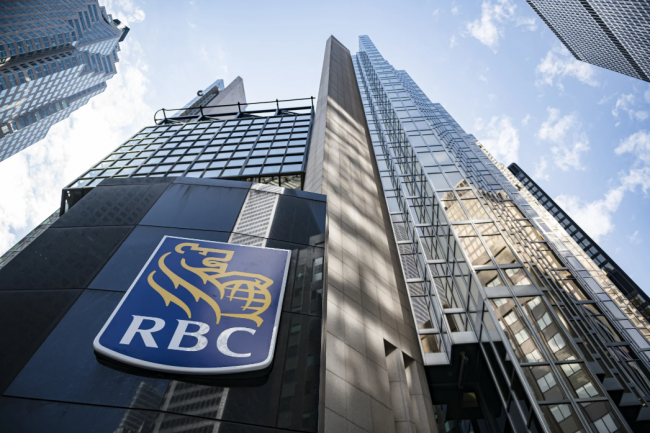Articles Menu

Jan. 25, 2023
New York City pension plans are attempting to force RBC to disclose its full greenhouse gas emission targets for 2030 because the bank keeps financing fossil fuel expansion despite making net-zero pledges.
On Tuesday, three of New York City’s pension funds — the NYC Employees’ Retirement System, Teachers’ Retirement System and Board of Education Retirement System — and NYC Comptroller Brad Lander announced shareholder resolutions at three massive American banks with major fossil fuel investments: Bank of America, Goldman Sachs, JPMorgan Chase and Canada’s largest bank and top fossil fuel financier, RBC.
The shareholder proposals, if passed, would require the banks to set absolute emission reduction targets for 2030 aligned with climate science, rather than relying on weaker emission “intensity” reductions that still allow for the total amount of greenhouse gas pollution to increase in our atmosphere.
“Shareholders applauded these banks when they set net-zero goals — but it can’t be all talk. We expect them to take the steps needed now to reduce emissions on the timeline to which they have committed,” Lander said in a statement. “Absent a concrete plan to reduce absolute emissions in the real world in the near term, any net-zero plan rings hollow.”
The comptroller’s office noted the resolutions are in line with the United Nations High-Level Expert Group recommendations for credible net-zero commitments. That expert group is chaired by former Canadian environment minister Catherine McKenna, who previously told Canada’s National Observer that a credible net-zero target demands near-term emissions reductions and the end of fossil fuel expansion financing. Banks can’t just rely on a net-zero by 2050 target, they have to show how they will decrease emissions this decade.
“There's a price of admission to say net-zero; you're either part of the solution or part of the problem,” she said.
The resolution filed with RBC, where the pension funds have a combined $37 million worth of stock, specifically requests that the bank’s absolute greenhouse gas emission targets include financing for the oil and gas and power generation sectors.
RBC spokesperson Andrew Block told Canada’s National Observer the bank would respond to the shareholder resolution before its annual general meeting in April. He also said the bank was “committed to achieving net-zero in our lending by 2050” and has set interim targets to help guide that goal.
In October, RBC published climate targets for 2030 focused on three sectors: power generation, the automotive industry and oil and gas. But each goal only aims to curb emission intensity, not absolute emissions — the amount of pollution that reaches the atmosphere, where it ultimately heats the planet. It is the absolute emissions that matter from the planet’s perspective.
RBC, along with Canada’s other biggest banks TD, Scotiabank, CIBC, and BMO, joined two international alliances designed to steer investments into a climate-safe future in October 2021, but a recent analysis from Paris-based climate finance think tank Reclaim Finance found Canada’s Big 5 banks have financed fossil fuel expansion to the tune of $46.4 billion since joining those alliances.
RBC's "awful record on climate change, including continued financing of fossil fuel expansionists, has caught the attention of some of the continent’s biggest and most influential pension plans,” says @sarahbeuhler with @standearth.
In one year since joining the Net-Zero Banking Alliance and Glasgow Financial Alliance for Net Zero, RBC provided $13.1 billion to companies expanding their fossil fuel reserves — 30 per cent more than TD, which, of the banks, was Canada’s second-biggest financier of fossil fuels.
RBC’s financing of fossil fuels last year means that since the Paris Agreement was signed in late 2015, it has provided over $270 billion to coal, oil or gas companies. Based on its 2021 financing, RBC is also the top bank in Canada funding oil and gas expansion, as well as the oilsands, pumping $9.6 billion and $6.8 billion, respectively, into those sectors.
“Royal Bank of Canada’s awful record on climate change, including continued financing of fossil fuel expansionists, has caught the attention of some of the continent’s biggest and most influential pension plans,” said Stand.earth climate finance strategist Sarah Beuhler in a statement. “RBC is dragging Canada backwards on our climate ambitions.
“Now, with New York City wielding its institutional investor power, all shareholders must support these climate resolutions at the bank’s AGM this spring,” she urged.
New York City pension plans throwing their weight behind climate-related resolutions is no guarantee the shareholder proposals will succeed. Last year, RBC shareholders shot down every climate resolution proposed.
In RBC’s “climate blueprint,” where the bank outlines its role in a climate-safe future, it notes it’s a signatory to the Net-Zero Banking Alliance. RBC CEO David McKay says he believes “capital can be a force for positive change,” and that the bank plans to deploy $500 billion worth of “sustainable finance” by 2025. Fossil fuels are not mentioned in that document.
RBC is currently under investigation by Competition Bureau Canada for allegedly misleading Canadians about its climate performance following a complaint from Indigenous leaders and climate organizers. The bank “strongly disagrees with the allegations in the complaint,” an RBC spokesperson previously told Canada’s National Observer.
[Top photo: The RBC building in Toronto on Thursday, April 7, 2022. Photo by Christopher Katsarov / Canada's National Observer]